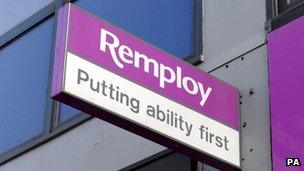Three Remploy factories to close
- Published

Remploy closures follow recommendations by an independent review
Three remaining Remploy factories are to close, leaving 160 disabled workers facing redundancy.
Remploy said no acceptable offers had been made for its furniture business, so it will close sites in Blackburn, Sheffield, and Baglan near Port Talbot.
A total of 196 employees now face losing their jobs.
Remploy said a potentially viable bid had been made for its automotive plants in Birmingham, Coventry and Derby.
Negotiations will now be held to complete that purchase as soon as possible.
'Careful consideration'
At the factories now set to be closed, workers will be invited to "at least two individual consultation meetings over the next 30 days to discuss the options and the support that will be available to them".
At Baglan, 54 disabled workers will lose their jobs, at Blackburn 18 will be made redundant, of whom 17 are disabled, and at Sheffield 77 will lose their jobs, of whom 74 are disabled.
In addition, 47 office, sales, and other staff will be made redundant, of whom 15 are disabled.
Commenting on the offers that it received for the furniture business, Remploy said there were a number of guidelines it used.
"The Remploy board has given careful consideration to the bids which were assessed for viability on a series of criteria including continued employment of disabled people, value for money for the taxpayer and the sustainability of the business," it said in a statement
"The board has determined that no viable business bids meeting these criteria were received for the Furniture business and as a result it will close and all its factories will now move to closure."
Last year, the government announced that 27 Remploy factories, which provide employment opportunities for disabled people, were to close.
The closures followed recommendations by an independent review into the way the government spent its disability employment budget.
It recommended that the government should divert funding to supporting individuals, rather than subsidising factory businesses.
- Published8 August 2013
- Published18 July 2013
- Published4 July 2013
- Published4 July 2013
- Published26 June 2013
- Published15 May 2013